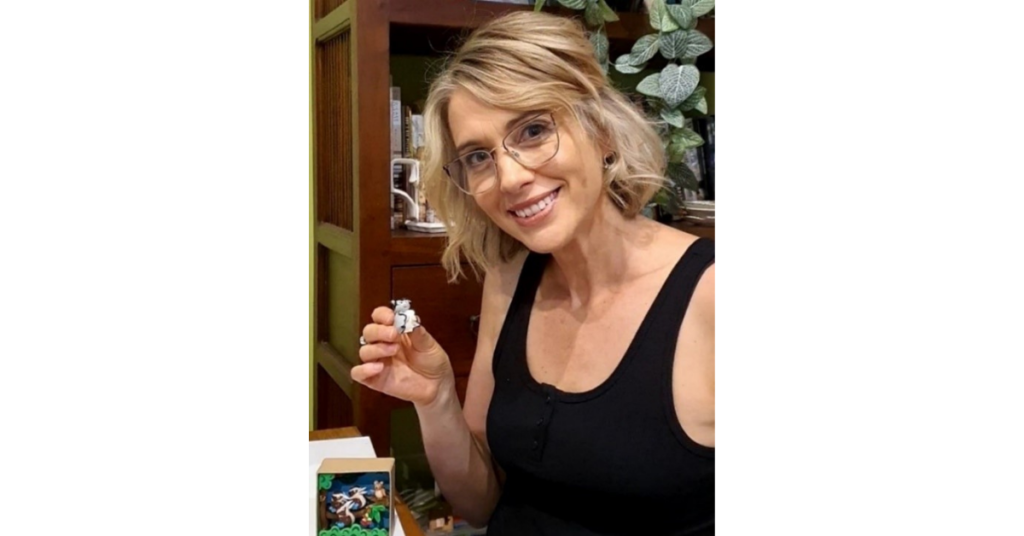
Learning Support teacher, children’s storybook author, and mother-to-three, Nadine, 49, Sydney, was diagnosed with the most common form of Multiple Sclerosis (MS), Relapsing Remitting Multiple Sclerosis (RRMS), by her neurologist seven years ago.
Prior to her diagnosis with this chronic disease of the central nervous system, Nadine had experienced excruciating nerve pain down one side of her back. Over the ensuing few weeks, the pain intensified, and travelled down her thigh. Her skin also became numb.
After visiting her GP, Nadine was refered to a neurologist, and underwent an MRI scan. After examining her MRI scan results, in combination with her medical history, her neurologist diagnosed her with RRMS.
Although initially overwhelmed with her diagnosis, Nadine chose to embrace life and use her diagnosis to fuel her passion for life.
Nadine has since worked hard to optimally manage her MS. She eats well, exercises regularly, and is nowadays, more adventurous than she was pre-diagnosis.
Today, Nadine is passionate about sharing her experience with MS with others, to help normalise the disease and shed light on the variability of MS.
This is Nadine’s story.
The sudden onset of severe, burning pain and itchiness in her back, that travelled down her right thigh and caused numbness of her skin, prompted Nadine to visit her GP, expecting to be diagnosed with shingles. However, she was referred to a neurologist who ordered an MRI and later diagnosed her with most common type of MS, just two months after experiencing initial symptoms.
Given she was only 43 years old at the time and was familiar with other women who had been forced to contend with various debilitating physical and neurological symptoms of MS, the news proved quite a shock.
“Like many other Australians, I immediately imagined living with MS would mean a life restricted by chronic pain and physical disability, based on the women I knew living with the disease.
“However, having worked with adolescents with disabilities for eight years pre-diagnosis, and watching how those kids lived everyday with determination, humour and patience, I drew inspiration from them, and chose to cope with whatever MS was set to throw at me with as much grace as they showed,” said Nadine.
Nadine hopes improving community awareness and education of the variable nature of MS will heighten treatment access for all Australians living with MS, allowing them to better manage the disease.
“Treatment subsidies make a real difference to people like me living with MS, because their affordability can help allow us to keep working, keep active and engaged in life,” said Nadine.
“Not everyone wants to reveal their diagnosis of MS to their employer or wider circle of friends, but for those who do, receiving understanding and encouragement are so important.”
The symptoms of MS can diminish quality of life by compromising one’s relationships, education, finances and career.1
“My symptoms come in cycles, as is the nature of RRMS. Fatigue can hit me hard, and quite suddenly, like the flick of a switch. I am fortunate to have incredibly understanding employers, who allowed me to reduce my work hours to help better manage my fatigue.
“Everyone’s journey with MS is completely different, from the symptoms we face, to the realities of managing the disease. While often invisible to those around us, MS has an impact on our physical and emotional well-being. I am passionate about sharing my experience to help shed light on the variable nature of MS symptoms,” Nadine said.
Nadine works hard to maintain a consistently positive outlook on life, but is aware the symptoms of MS are extremely unpredictable and can vary over time.2
“I just try to get on with my life as much as possible and take each day as it comes. I’m fortunate my symptoms have been fairly manageable, but MS is such an unpredictable disease, and I live in fear with the knowledge it may all change overnight.
“Although I try to stay positive, and this is what most people see, I’m conscious my MS poses a constant, underlying threat to my future.”
Nadine hopes for further, ongoing research into treatment and management options to enable those with MS to live their life without fear or interruption.
“I know everyone living with MS is hoping that researchers might one day find a cure for this debilitating disease.”
